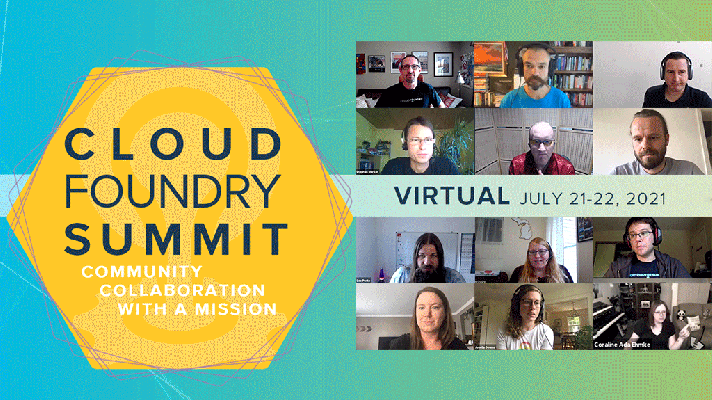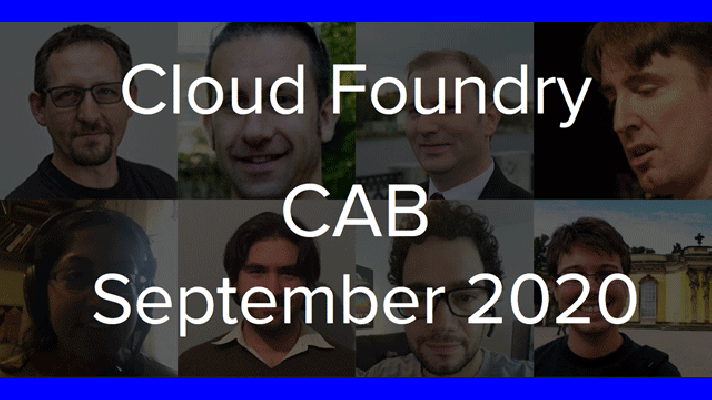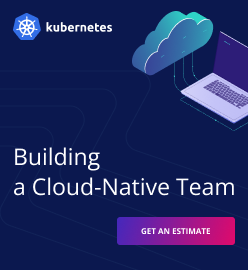Top Quotes from Cloud Foundry Summit North America 2020
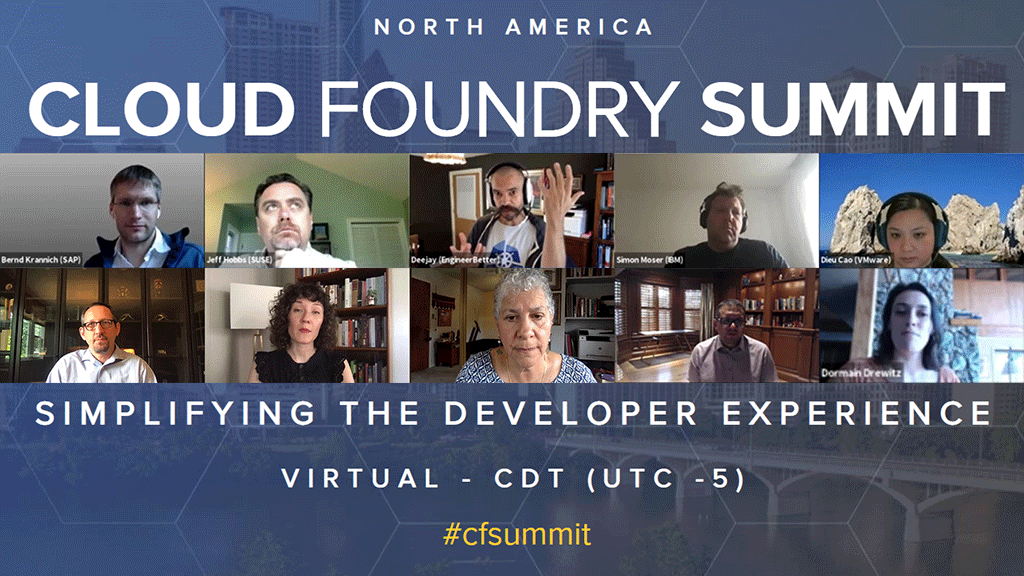
Major announcements
Cloud Foundry Summit North America 2020 was the first ever virtual summit held in the history of the community. Much of the conference centered on bringing Cloud Foundry and Kubernetes together with projects like KubeCF and CF4K8s. VMware also contributed to this effort by announcing Tanzu Application Service for Kubernetes available as a public beta. In its turn, SUSE released Cloud Application Platform 2.0, delivering more of Kubernetes experience.
Additionally, the general availability of CF CLI v7 was major news. The release provides new capabilities, such as rolling application developments, using metadata, and much more. Read about all the announcements in more detail in the official press release.
The conference also highlighted the impact brought on by the ongoing pandemic, and how this will influence organizations and developers moving forward. The community acknowledged the social unrest affecting the United States and other parts of the world.
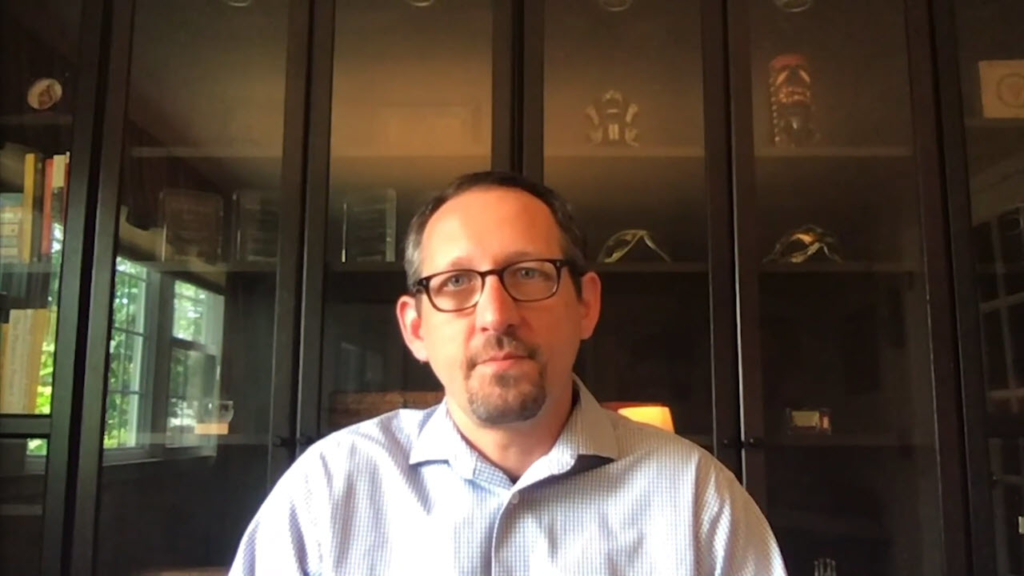 Chip Childers welcoming the summit attendees (Image credit: CFF)
Chip Childers welcoming the summit attendees (Image credit: CFF)
Adapting to the pandemic reality
With the summit going virtual, it enforced an idea most organizations and individuals have started adjusting to since the World Health Organization announced the COVID-19 pandemic back on March 11. Working from home is the new reality and plenty in the community share this sentiment.
One thing is certain in this pandemic reality, we are going to see a lot of changes in how organizations operate. The ability to adapt quickly will be essential as we continue to learn more about COVID-19.
- “The ancient Greek philosopher Heraclitus said ‘change is the only constant in life.’ That’s something we embody in the spirit of our project and community.” —Chip Childers, the Cloud Foundry Foundation
- “COVID-19 wasn’t part of anyone’s plan. Everyone was caught by surprise, and yet, everyone has had to deal with it. This has really demonstrated folks who have been well prepared to handle it, as well as folks who are struggling to adapt and change.” —Dormain Drewitz, VMware
- “It is almost impossible to predict what the world will look like in the coming years. One thing is clear, the world is changing, businesses are changing, and society is changing in some profound ways.” —Craig McLuckie, VMware
- “The ability to change plans quickly is going to remain a valuable asset for any organization.” —Dormain Drewitz, VMware
- “A quarter ago, we didn’t know as much as we know now about not only the COVID-19 itself, but also the economic, retail, and civilian impacts. This is still the reality that most people are dealing with. It begs the question, how quickly can you change your plan? That is the litmus test for the developer experience that you have.” —Dormain Drewitz, VMware
- “At this point, while folks would love to have more concrete plans, the plan to change is the plan. Being able to make those frequent changes is a critical factor in success to making sure that the developer experience is COVID-19 immune.” —Dormain Drewitz, VMware
- “From individuals to companies and governments, our goal as a community has always been to help developers go from an idea to production in days and hours, not weeks and months. Even at this uncertain time, we can feel proud that our platform has helped countless organizations respond to new requirements and changing conditions rapidly.”
—Chip Childers, the Cloud Foundry Foundation - “Organizations that are able to deploy code more frequently and have a faster lead time from commit to deploy are also the same organizations that are able to recover from incidents, have fewer failure rates, and have a higher association with their overall business performance.” —Dormain Drewitz, VMware
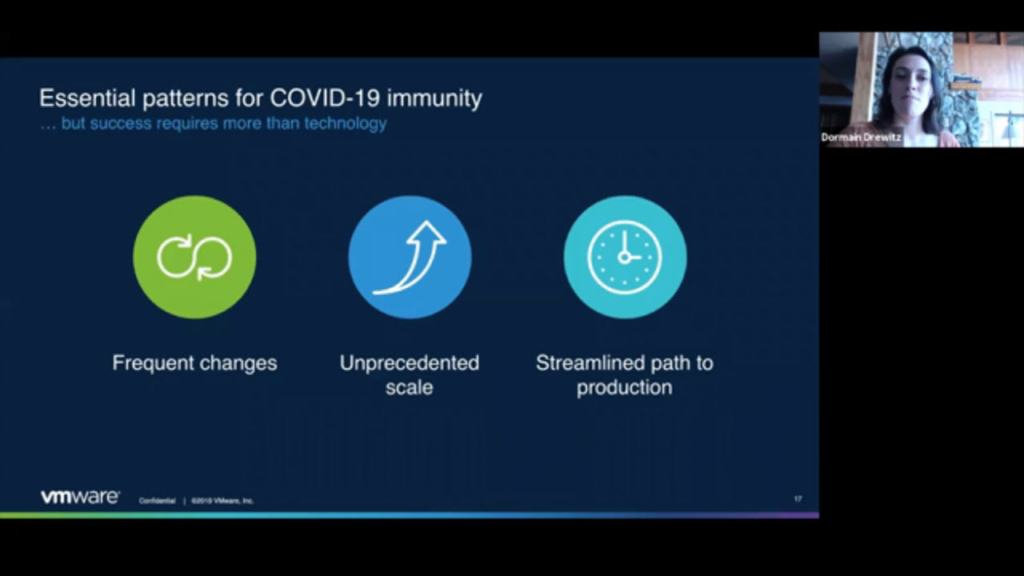 Dormain Drewitz of VMware talking about adapting to a pandemic reality (Image credit: CFF)
Dormain Drewitz of VMware talking about adapting to a pandemic reality (Image credit: CFF)
Driving developer experience
As we all adjust to working from home, organizations will have to consider unusual factors and take these into account when creating a new developer experience. Now, whether it’s at the office or at home, developers will play a significant role in how organizations will succeed.
- “Cloud Foundry has been a critical part of the approach, but it goes beyond just the technology. There are changes to people and process, as well as the ways developers are working. The architectures and the patterns that the applications are being built in all need to go hand in hand with the underlying technology components in order to create this COVID-19 immune developer experience.” —Dormain Drewitz, VMware
- “Scalability is something that doesn’t incur a lot of overhead. Make sure that the scaling just works, so that developers can focus on delivering new features and digital experiences to consumers. That’s critical to the COVID-19 immune developer experience.”
—Dormain Drewitz, VMware - “When I think about what is going to ultimately differentiate organizations that are able to navigate the changes we face right now, as businesses have to operate in profoundly different ways, I keep coming back to the developer being a catalyst for future success.”
—Craig McLuckie, VMware - “Ultimately, our community of contributors, committers, and project leads, after we make this transition, we’ll be in an even better position to focus on developer experience.”
—Chip Childers, the Cloud Foundry Foundation - “How effectively enterprises can bring developers’ capabilities to bear, to drive the changes that they need, to support their customers in this increasingly complex and evolving ecosystem, will fundamentally define their ability to compete and prosper in this ecosystem.” —Craig McLuckie, VMware
- “I challenge each of you to think about how we craft the right experience for developers. Having empathy for the amount of cognitive lead we put on as new capabilities roll out, we make it as simple as possible.” —Chip Childers, the Cloud Foundry Foundation
- “Increasingly, the types of conversations I have with organizations that are consuming technologies like Cloud Foundry is really about the developer experience, the productivity, the thing that really matters to organizations.” —Craig McLuckie, VMware
- “A good developer experience is a productive developer experience. It’s one where your code sees the light of day in a relatively timely fashion, and you can see the impact of your work on the world and the business you’re working on.” —Dormain Drewitz, VMware
- “Friction to change is the measure of a technical debt.” —Dormain Drewitz, VMware
- “A lot of people viewed the heritage of Cloud Foundry as inaccessible or unapproachable, because it’s such a heavy weight or it’s too ‘enterprisey.’ I never got into Cloud Foundry, because it was ‘enterprisey.’ I got in, because it was an awesome developer experience no matter what size a business or a developer group you had. It was a great idea, and it still is a great idea. By making it much more accessible and approachable, I hope other people will find that this is the easy application platform that you need for any developer-size group.”
—Jeff Hobbs, SUSE - “It’s a natural evolution that the microservices-based architecture significantly improved the overall software delivery performance and the productivity by making faster releases.” —Dilleswara Anupoju, Comcast
- “The microservices approach allows teams to be autonomous and empowered to choose their language, framework, database systems, and caching systems based on their use case.” —Dilleswara Anupoju, Comcast
- “The general availability of the Cloud Foundry CLI v7…represents the first version of our CLI that uses the v7 Cloud Controller APIs entirely. You get more capabilities, more granular control, but some of the same exact simplicity of the past versions’ developer experience has had.” —Chip Childers, the Cloud Foundry Foundation
- “Modern development techniques are much simpler with Cloud Foundry as a result of the new CLI, which abstracts away the nuances of the CF API into a command-line interface that’s easy and elegat to use.” —Josh Collins, VMware
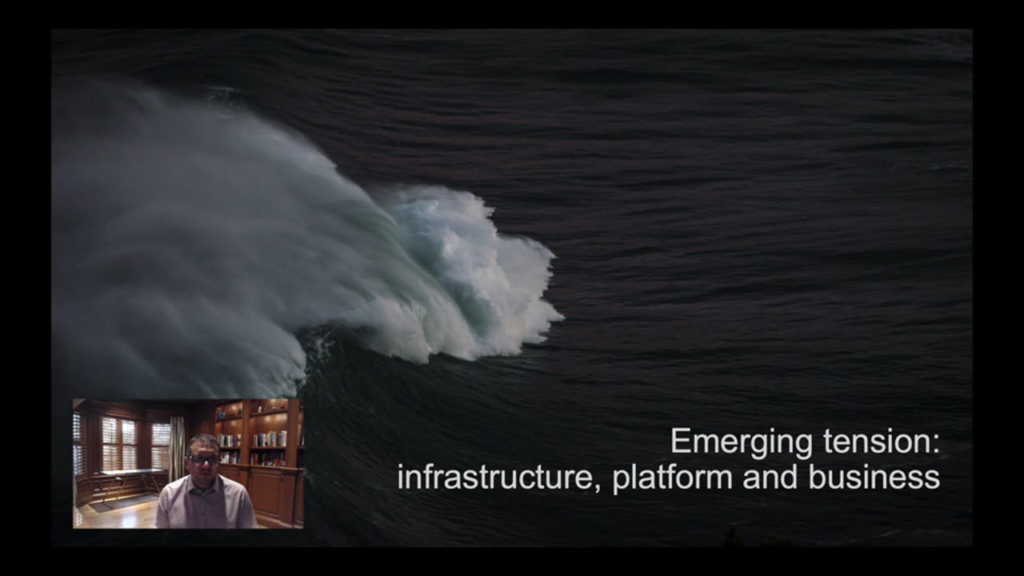 Craig McLuckie (Image credit: CFF)
Craig McLuckie (Image credit: CFF)
Merging Cloud Foundry and Kubernetes
In the last few years, Cloud Foundry has been critical in enabling organization to scale up and speed up their development cycles. As Kubernetes became increasingly prominent, the community adapted quickly. Now, we have Cloud Foundry on Kubernetes, which brings the best of both worlds.
- “When I took over as Executive Director, I realized that the energy of our community was growing around a new focus—bringing the world-class developer experience of Cloud Foundry to the Kubernetes infrastructure everywhere. We’ve come a long way in that short amount of time.” —Chip Childers, the Cloud Foundry Foundation
- “KubeCF is designed to provide the full Cloud Foundry experience you know today on top of Kubernetes.” —Chip Childers, the Cloud Foundry Foundation
- “The CF4k8s project is fundamentally about reimagining our architecture. It takes a slightly different approach in that it’s going to build from the basic functionality,
cf push, and grow in capability over time.” —Chip Childers, the Cloud Foundry Foundation - “Paketo represents a rebirth of the buildpack effort. It aligns with the CNCF buildpack specification, which means it’s compatible with many platforms. Paketo buildpacks can be adopted across the broad cloud-native open-source community, including Kubernetes.”
—Chip Childers, the Cloud Foundry Foundation - “CF4K8s is putting Cloud Foundry on Kubernetes. It reinvents the platform as a native Kubernetes application platform for deploying, running, and managing applications.”
—Andrew Wittrock, VMware - “Agile teams need Agile infrastructure. There’s an absolute need to bring technologies like Cloud Foundry into the mix. By harmonizing technologies like Cloud Foundry with emerging infrastructure abstractions like Kubernetes, we’ll create disproportionate positive outcomes for organizations large and small. ” —Craig McLuckie, VMware
- “Kubernetes has done a great job of normalizing infrastructure. The reason it has achieved high levels of popularity is because finally we had the promise of a technology that would make every cloud, on-premises, and edge environment feel consistent.” —Craig McLuckie, VMware
- “The amazing opportunity that we have as a community is to bring these worlds together, to look at the technology like Kubernetes as a way to normalize the playing field, and to reduce the complexity of deploying a very broad cross section of workloads into an infrastructure environment. Technologies like Cloud Foundry emerge as a way to really light up those environments to solve the problems that every developer has everyday: how do I get my application into a production environment?” —Craig McLuckie, VMware
- “Companies have been embracing Kubernetes, but then stuggle with getting production workloads onto it. That’s where I see the power of Cloud Foundry.” —Craig McLuckie, VMware
- “This mission of genericization, modularization, and democratization of the technologies will serve us well. It allows us to bring a very sharp focus to the needs of day-to-day developers, and it creates an amazing opportunity for us to take a positive step forward in bringing together two of the most robust and healthy open-source communities out there.”
—Craig McLuckie, VMware - “I’m excited to see the focus on bringing Kubernetes as a natural orchestration technology to Cloud Foundry, and ultimately bringing the super highway experience of being able to go from a developer’s desktop into that production context in as an efficient way as possible.”
—Craig McLuckie, VMware - “KubeCF is more on the pragmatic approach. It’s taking everything that currently exists from its VM heritage and making that work on Kubernetes.” —Jeff Hobbs, SUSE
- “СF4K8s is taking the essential developer experience that Cloud Foundry provides, but does it from Kubernetes. ” —Jeff Hobbs, SUSE
- “Companies have been embracing Kubernetes, but then struggle with getting production workloads onto it. That’s where I see the power of Cloud Foundry.” —Craig McLuckie, VMware
- “Both KubeCF and СF4K8s value the developer experience in preserving the simplicity of
cf pushfor application developers, so they don’t have to write 500 lines of configuration, routing, policies, and all the various things.” —Dieu Cao, VMware - “Someone coming from the BOSH world is going to have a soft landing spot in KubeCF, because you don’t have to learn all the concepts right there.” —Simon Moser, IBM
- “Someone focusing on using all the latest Kubernetes concepts will find a natural match in CF4K8s.” —Simon Moser, IBM
- “For the longest time, Cloud Foundry didn’t have an answer to Kubernetes. Now, we’re in a luxurious situation, where we have two.” —Bernd Krannich, SAP
- “I’m hoping that when we get back to this panel in a year, that KubeCF and CF4K8s will be merged. There isn’t a need to keep them both for a long period of time.” —Simon Moser, IBM
- “We don’t want to see two different implementations of Cloud Foundry on Kubernetes. We do see the eventual merge of KubeCF and CF4K8s as a singular Cloud Foundry on Kubernetes experience. They’re coming at it with a top-down and bottom-up approach, and there will be a meeting in the middle.” —Jeff Hobbs, SUSE
- “I hope to see some interest from the Kubernetes folks toward Cloud Foundry. It’s one thing to keep and grow the existing Cloud Foundry user base and community, but by moving Cloud Foundry on top of Kubernetes, I hope we can get the Kubernetes folks excited about the Cloud Foundry ecosystem. ” —Bernd Krannich, SAP
- “There’s an opportunity that we as a community can seize in order to get that interest even further. Anyone who has been down in the weeds writing RBAC rules knows that it’s not the nicest thing. If we can replace the simple UAA authorization model and translate it under some RBAC style enforcement rule, that would be something that would help bring the communities together. It would also finalize that journey that we are on in bringing Cloud Foundry and Kubernetes together.” —Simon Moser, IBM
- “In any organization, you’ll want to use both Cloud Foundry and Kubernetes. Some workloads are more suitable for running in a Kubernetes cluster, and other workloads will have an affinity toward Cloud Foundry. So, whatever we build when it comes to data service automation should integrate with both.” —Julian Fischer, Anynines
- “We were ahead of the times in using containers. We had to build something that served the purpose of delivering a reliable, multi-tenant application platform. Today, Kubernetes has matured into a general-purpose platform, and our community is embracing it.”
—Chip Childers, the Cloud Foundry Foundation - “CF4K8s is a brand-new reenvisoning of the current platforms on the web. It deploys much faster at less than one-fifth of the deploy time of a similar BOSH deployment.” —Andrew Wittrock, VMware
- “For a long time, Cloud Foundry administrators have wanted more declarative interfaces for managing their platforms. While BOSH offered some of those, it’s much easier for us to offer them in a more Kubernetes-native way.” —Connor Braa, VMware
- “Already, we see a lot of great possibilities in regard to CRDs with both platform and application developers being able to manage their different components declaratively. In addition, we see CRDs as an entry point to make the Cloud Foundry ecosystem more extensible.” —Angela Chin, VMware
- “Moving Cloud Foundry onto Kubernetes has forced us to rethink Cloud Foundry. Customers often go through the same transformation when they adopt cloud-native technologies.” —Troy Topnik, SUSE
- “Now that we’ve worked very hard to get Cloud Foundry to where it is, get it working on Kubernetes, get the integration of new, next-generation components, it would be great if we can catch that wave and use our momentum to gain more speed.” —Troy Tropnik, SUSE
- “KubeCF provides everything now, passes acceptance tests, and there are commercial releases based on it. CF4K8s is the proving ground for the next-generation components. Over time, we’re going to make these projects converge.” —Troy Topnik, SUSE
- “Kubernetes has so much to offer, and the developer experience of Cloud Foundry is amazing, and people love that experience. Why don’t we integrate the two together to make this even more rock-solid solution? And that’s what we did with Tanzu Application Service for Kubernetes. It gives you that familiar
cf pushexperience and the abstraction that Kubernetes brings.” —Boskey Savla, VMware - “I’m excited that the CF CLI v7 hopefully will be going live this summer. That will be applicable for both CF4K8s and KubeCF, as well as the original flavor of Cloud Foundry on VMs. That will bring rolling deployments as a first-class citizen on Cloud Foundry.” —Dieu Cao, VMware
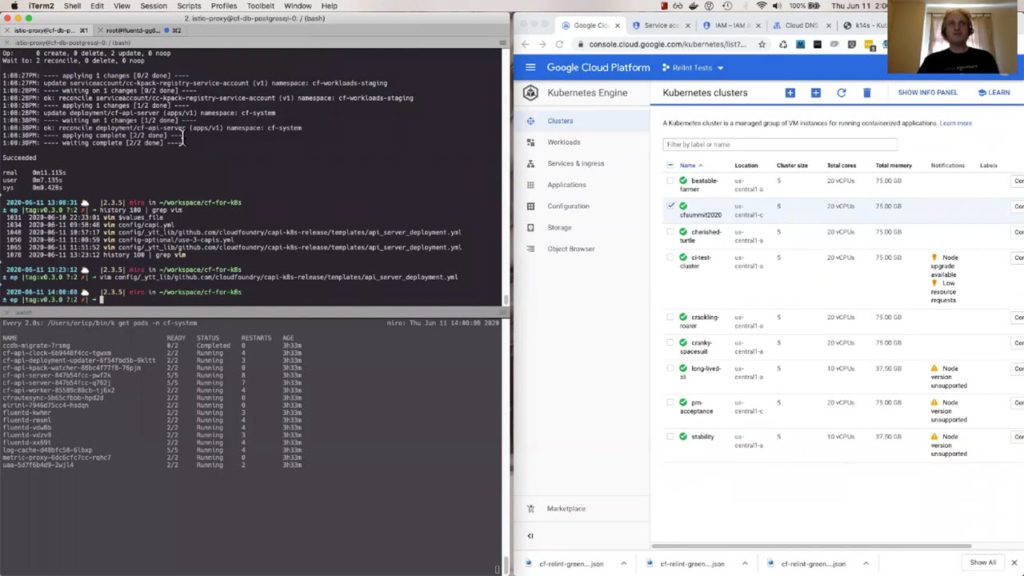 Andrew Wittrock (Image credit: CFF)
Andrew Wittrock (Image credit: CFF)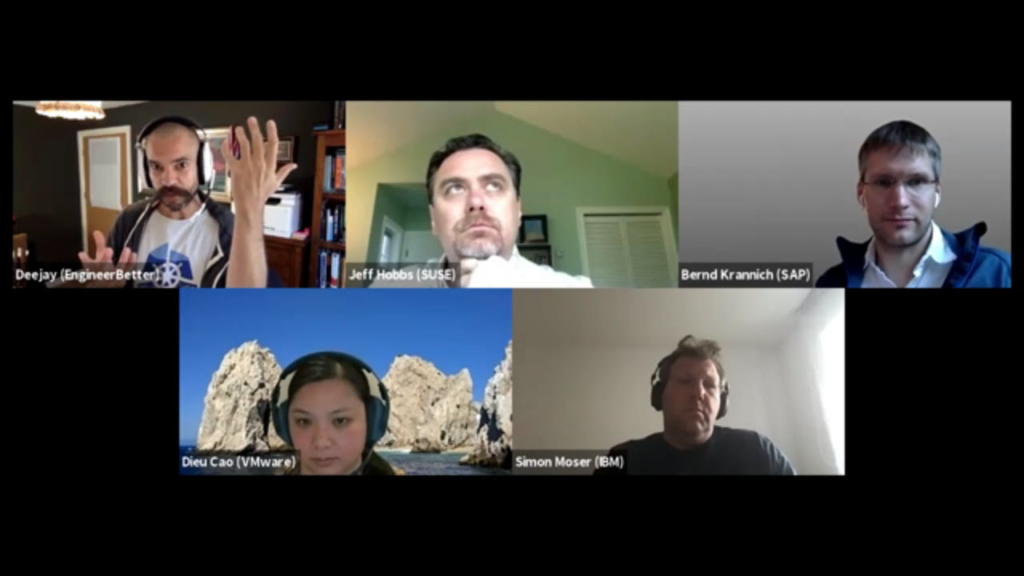 Daniel Jones, Jeff Hobbs, Bernd Krannich, Dieu Cao, Simon Moser
Daniel Jones, Jeff Hobbs, Bernd Krannich, Dieu Cao, Simon Moser(Image credit: CFF)
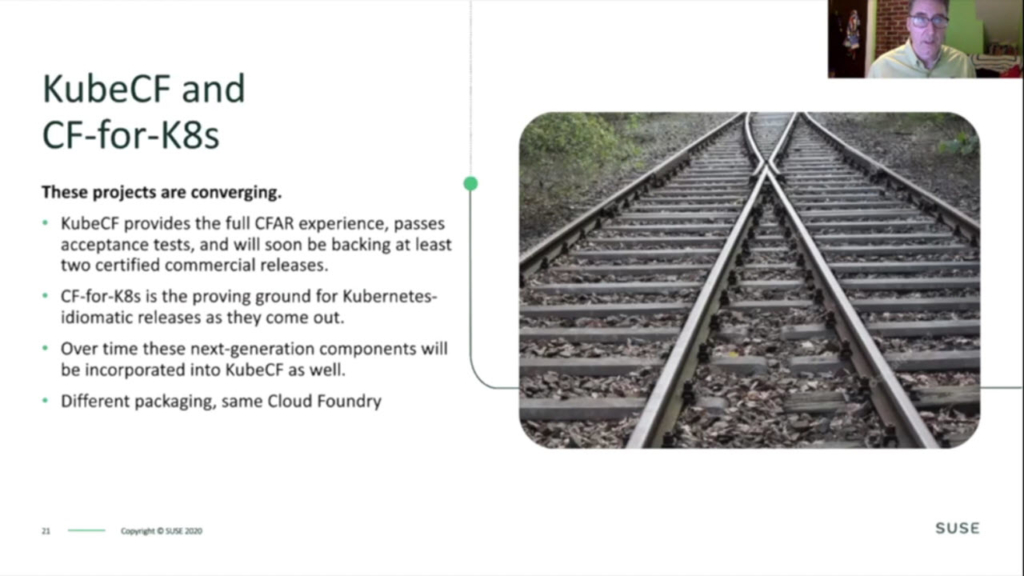 Troy Topnik contemplating about KubeCF and CF4K8s (Image credit: CFF)
Troy Topnik contemplating about KubeCF and CF4K8s (Image credit: CFF)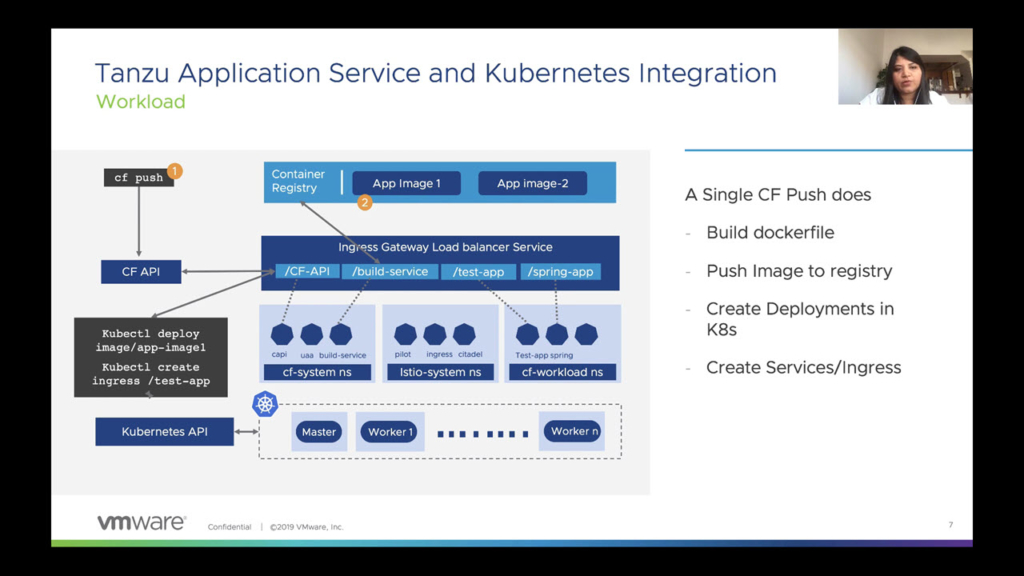 Boskey Savla (Image credit: CFF)
Boskey Savla (Image credit: CFF)
Inclusivity opposing systemic racism
While the whole world is impacted by the pandemic, the United States is facing an additional struggle brought on by centuries of oppression. The Cloud Foundry community acknowledges this reckoning and condemns social injustice.
As individuals, we may not have the capacity to fix all injustices, but we should make the effort to understand the root of the problem and affect positive change where we are able to.
- “Racial inequity is a problem of bad policy, not bad people. None of us created this system, certainly, none of us created history, and none of us created colonization and capitalism. All these are systems that we have been born into, but we have to understand that in order to keep these systems going, we have to be in denial about the heartbeat of racism. We have to not notice what is going on.” —Dr. Shakti Butler, World Trust Educational Services
- “We might say something like this is a place where everybody has the chance to succeed, you just have to pull yourself by your bootstraps. Well, what if you don’t have any boots? Maybe someone will come along and offer you boots, but that doesn’t mean that you’re really part of society with a full voice, rights, and privileges that everyone deserves.” —Shakti Butler, World Trust Educational Services
- “In the United States and in countries around the world, we are experiencing an overdue, necessary, and important reckoning with systemic racism. Our community has always prided itself in being welcoming, inclusive, and working hard to be diverse. While we may not have the power as a community to fix all the injustice in society, we are a place for conversation. Each of us should spend the time to understand our biases, both explicit and implicit. Each of us should spend time having empathy for those around us.” —Chip Childers, the Cloud Foundry Foundation
- “I encourage all of you to continue to embrace that change is constant. Continue to be welcoming and inclusive. Keep building toward our future.” —Chip Childers, the Cloud Foundry Foundation
- “Being inclusive is at the heart of the Cloud Foundry community spirit.” —Chip Childers, the Cloud Foundry Foundation
- “The foundation will continue to work to do our part to dismantle systemic racism, in particular, in technology, but also wherever we encounter it…But everyone needs to do their part.” —Chip Childers, the Cloud Foundry Foundation
- “We must not only demand change from our policy makers, but create the change ourselves by using the power and privilege of the technology industry.” —Caitlyn O’Connel, the Cloud Foundry Foundation
- “I’m personally not qualified to comment on the challenge we face as a society, but I do stand in solidarity with those struggling for racial equality and justice in the world.” —Craig McLuckie, VMware
- “The foundation supports Black Lives Matter and believes in racial equity. As a community, we have the opportunity to take a look at white supremacy in the tech industry and beyond and learn how to dismantle it.” —Caitlyn O’Connel, the Cloud Foundry Foundation
- “Everyone suffers from oppression, and we must explore the roots of racialization. We have to understand the root causes of the pathologies we see today, which impact all of us and affect black, brown, poor, and indiginous people more intensely.” —Dr. Shakti Butler, World Trust Educational Services
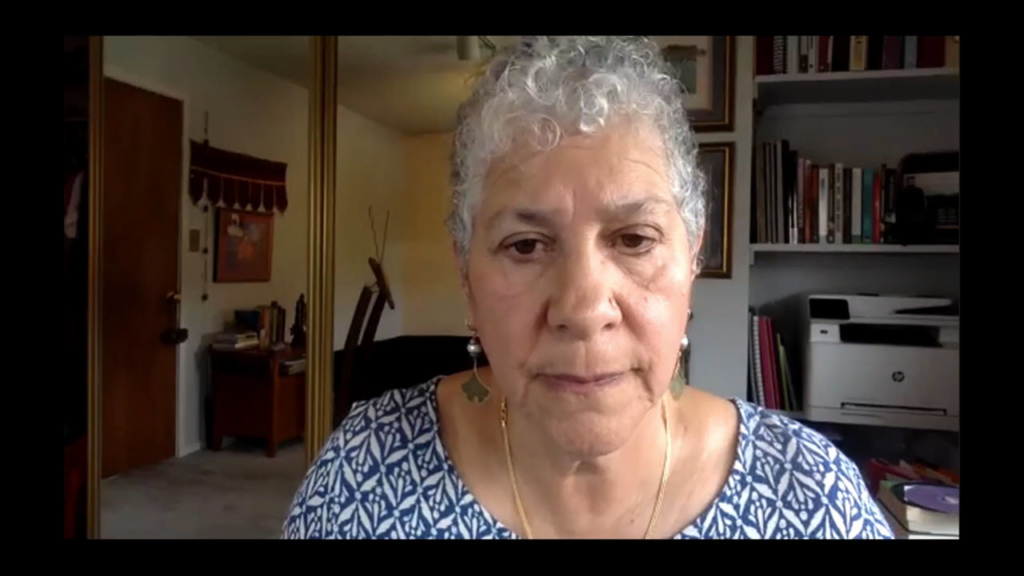 Dr. Shakti Butler (Image credit: CFF)
Dr. Shakti Butler (Image credit: CFF)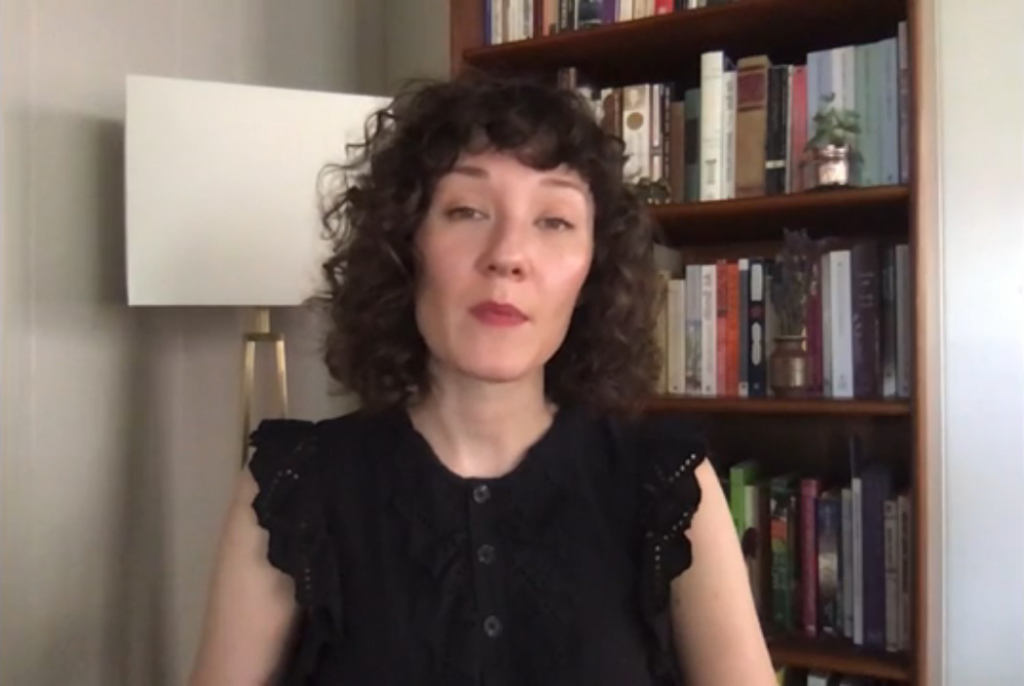 Caitlyn O’Connel opening the diversity luncheon (Image credit: CFF)
Caitlyn O’Connel opening the diversity luncheon (Image credit: CFF)
Next summit soon
Moving forward, other organizations will likely follow the foundation’s lead and embrace the idea of going virtual. In the current climate, this change is not just inevitable, but also necessary to survive. Cloud Foundry Summit Europe 2020 to be held in October was supposed to take place in Dublin. However, it seems the event will go virtual, as well. The Cloud Foundry Foundation is to clarify the matter later this July.
Want more from the summit? Check out the video recordings of the sessions. Or, to feel the spirit of the event, view the #CFSummit hashtag on Twitter.
Note: We’d like to thank the foundation (and Caitlyn O’Connel specifically) for the opportunity to make a media coverage of the summit.
Alex Khizhniak, and Valeria Vishevataya.




